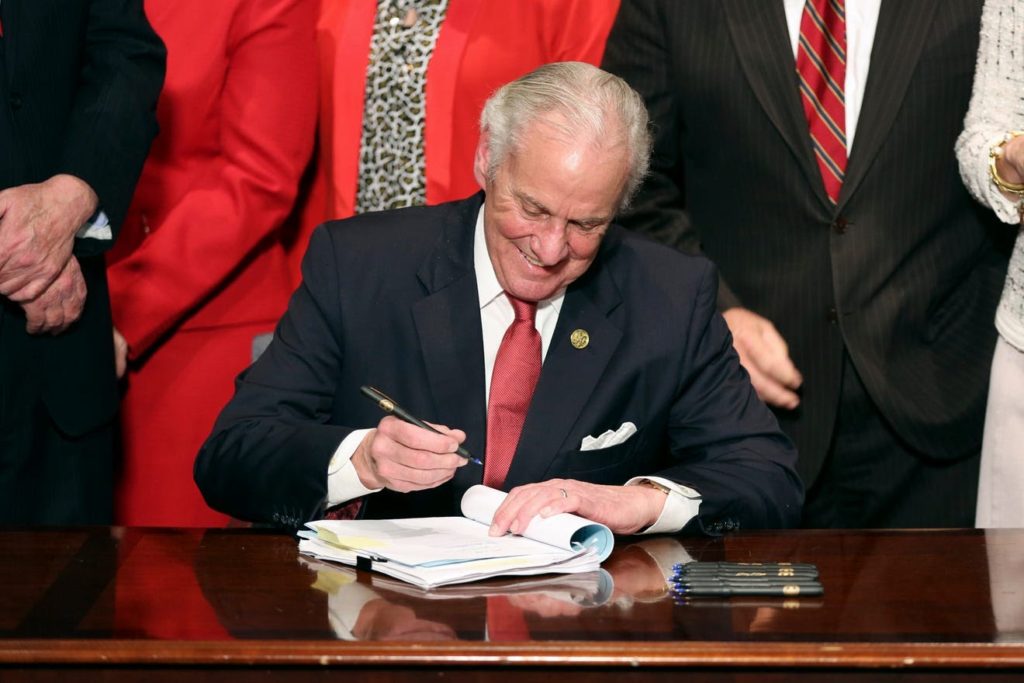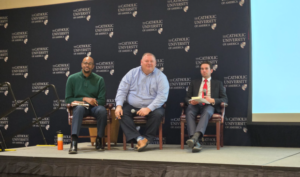South Carolina Heartbeat Bill In Review

Image Courtesy of Chicago Tribune
By Eduardo Castillon
“If there’s not a right to life, then what rights is there,” said South Carolina Governor Henry McMaster on February 18 just before signing a bill that would prohibit abortions in the case that a fetal heartbeat was present. “What rights exists, if not the elementary, fundamental, profound right to life.”
The next day, Judge Mary Geiger Lewis called for a restraining order for two weeks on the bill while both Planned Parenthood and the Center for Reproductive Rights move forward with their lawsuit on March 9. The reproductive health nonprofit said in court documents that the restraining order was necessary due to how the bill would actually accomplish its goal in preventing more than 75 women to have abortions they’d already scheduled with Planned Parenthood.
Many pro-choice proponents take issue with the bill on the grounds that the bill would leave just five to six weeks for an abortion to be performed, typically before a woman is even aware that she is pregnant. This is the reason that much of the response to the bill has been the framing of it as a bill to ban almost all abortions, rather than a heartbeat bill.
The bill’s official title is the South Carolina Fetal Heartbeat and Protection from Abortion Act and it is based on how crucial a fetal heartbeat is as a predictor of a pregnancy reaching live birth. There are currently many similar bills that are also being contested, moving up the courts in what many pro-life advocates hope to be a challenge to Roe v. Wade’s legalization of abortion. This is likely why the bill does not say anything about a particular point where life or the human person begins, only stressing the medical importance of the fetal heartbeat test.
It should also be noted that the bill makes exceptions to its prohibitions, namely in the case of a medical emergency or the pregnancy being the result of either sexual assault or incest. The bill defines a medical emergency strictly in terms of the mother’s physical wellbeing, not psychologically or emotionally.
It also requires the medical practitioner to report “the medical condition that the abortion was asserted to address and the medical rationale for the conclusion that an abortion was necessary to address that condition.” In the case of incest or sexual assault, the doctor would also be required to report the allegation to the county sheriff. Were a doctor to violate the act, they would be liable to face a ten thousand dollar fine or up to two years in prison. The mother would face no charges and would even be able to sue for ten thousand dollars in damages.
In a short press release by the Center for Reproductive Rights, the bill is framed as an obstacle for affordable health care and a threat to “the constitutional right to an abortion established by Roe v Wade.” The press release by the two global organizations criticizes the anti-Roe v Wade trend of democratically elected lawmakers by calling it “politics at its worst.”
Despite the claims made in the lawsuit, Alan Wilson, the State Attorney General, stated in an email to USA Today that he believed the heartbeat bill to be constitutional and was ready to defend it all the way to the Supreme Court if he had to. The press release also mentioned that the bill may block almost all abortions for the million women living in South Carolina.
While a majority of abortions in South Carolina occur between seven and 13 weeks of pregnancy, according to the Department of Health and Environment Control, that majority makes up 53.9%, not the “almost all” estimate that is being asserted. In fact, abortions before six weeks made up 45.5%, nearly half.
It is important to look at the overall trend of similar bills to the new South Carolina one. The bills are in an endless state of tug of war, where one side is the pro-choice movement with their chief belief in a right to bodily autonomy, while on the other is the pro-life movement with their belief of a right to life. The result in terms of actual legislation that Americans have to deal with is one that does not commit to either ideal, not only failing everyone, but creating a system where the left hand does not know what the right is doing. This indecision can be seen in many of America’s current hot-button topics, but this new bill once again brings this problem to light in regards to abortion.








